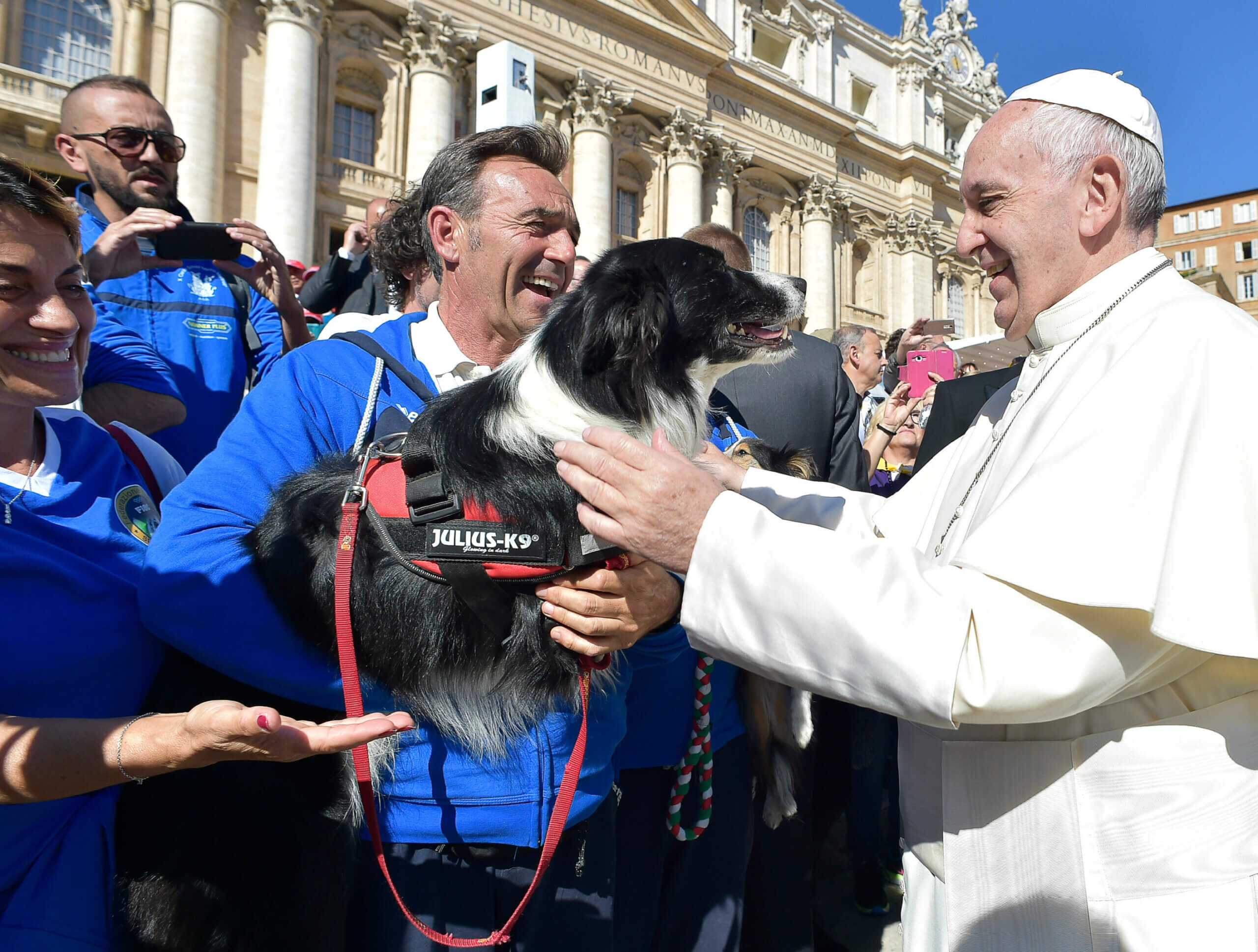Above: Pope Francis pets a dog at the general audience in St. Peter’s Square on October 5, 2016. © L’Osservatore Romano
A few days ago Pope Francis made the news, revealing that he had “scolded” a lady who allegedly asked him for a blessing for her dog, which she had called “my child.” There have been conflicting reports of this happening. The Pope at the States General about the birth rate, said among other things:
I greet her and she opens a bag. And she says: ‘Will you bless my child?’ It was a little dog. There I lacked patience and I scolded her: ‘Madam, many children are hungry and you with your dog’… Brothers and sisters, these are scenes from the present, but if things go like this it will be the habit of the future, let’s be careful.
Pope Francis’ informal style sometimes conveys messages that probably were not in the Pope’s original intentions. The animal rights associations rose up saying that they did not agree with the Pope’s words and that those who do not love animals do not love children. And obviously it was pointed out that these words came from a Pope who had chosen to call himself Francis.
But we will come back to St. Francis later.
The woman in question is a teacher, her name is Simona Rosati and she would later declare that she did not ask for the blessing for her dog. The issue would have been that once the name of the little dog, Mialma (mi alma, my soul in Spanish) had been told to the Pontiff, the same Pontiff would have suggested changing the name to one more suited to a little dog. Now, there is certainly a discrepancy between the two stories and excluding that the little dog asked for the blessing itself, something doesn’t add up. However, the woman made it known that she did not feel offended by the veiled reproach addressed to her by Francis, which he considered as the reproach of a grandfather.
I don’t think the Pope’s remark was an act of contempt for animals, it was simply an anecdote that, told out of context, seemed to say something else. I think the Pope well understands that loving animals is certainly a Christian act and that many (including myself) have found great comfort in the company of these little friends. How many elderly or sick people find help in these creatures and therefore we must certainly respect them with gratitude for what they can offer us. I think the Pope was referring to the love that some have for animals, which sometimes seems to replace that for people. The problem is certainly not animals, but the ideologies that use animals to pass completely distorted messages. Animals are certainly God’s creatures and as such they must be treated with dignity, but also with the necessary measure and with respect for the order established by the Creator.
The protesters’ reference to St. Francis is interesting, precisely because it shows how some things can easily be distorted when repeated to the bitter end. And here the “myth of St. Francis of Assisi” comes into play, who is passed off as a kind of 70s leader, all pacifism, environmentalism and universal love. The scholar Guido Vignelli (Franciscan Catechism) has written well to try to dispel some myths surrounding Saint Francis, including the animal rights one:
Far from considering himself equal to animals, St. Francis exercised a special authority over them. He did not limit himself to talking to them, but he commanded them as their lord and master, and they obeyed him through anticipating his desires. It seems that, through a divinely ordained gift, he had regained that dominion over creatures that our ancestors exercised in the earthly Paradise before the original Sin. This tended towards the anticipation of a universal reconciliation between man and animals, bringing all back into the state of original harmony.
One must be very careful not to turn St. Francis into a kind of chaplain of the dominant narrative. He was a Catholic saint in the deepest sense of that term, not a hippie.
Pope Francis’ communication style sometimes creates problems, we have already observed this in the past. I believe that his words were intended to convey that animals should not be idolized and that they should not be put in the place of children. It is certainly nice that there are children you can also have animals but, obviously, a dog is not a child. This must be clear, however much love we owe to animals, a dog (or cat or other species) is not a child. And when it is thought that an animal can replace a child, the problem certainly does not lie with the animal, but with the owner.


